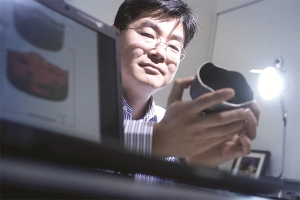Double ARC success for metals research
Research news
Two Deakin projects have been successful in the latest round of Australian Research Council (ARC) Linkage awards.
The scheme supports collaborative research that connects industry with university researchers and helps to build Australia’s prosperity.
Deakin’s new Pro Vice-Chancellor (Strategic Partnerships), Professor Peter Hodgson, from the Institute for Frontier Materials (IFM), will lead a project on “Micro-roll forming of metal bipolar plates for fuel cells.”
This project aims to develop a novel forming technology that meets a number of challenges, particularly due to the low thickness of the material to be formed. The researchers hope to achieve advanced computer models for process design and new micro-forming technology that is validated through extensive laboratory and plant trials.
The research team also includes Deakin’s Dr Matthias Weiss and Associate Professor Bernard Rolfe, as well as Mr Henry Wolfkamp, Mr Richard Taube and Dr Daniel Wilkosz from the partner organisations, which include Australian Rollforming Manufacturers Pty Ltd, the Ford Motor Company of Australia and the Ford Research and Advanced Engineering Centre.
The second successful Deakin project will be led by Professor Jeong Yoon, from the Faculty of Science, Engineering and Built Environment, and aims to reduce aluminium waste.
Over 200 billion aluminium beverage cans are produced worldwide each year (including 30 billion in Australia), but aluminium sheet forming failure has led to a problematic level of waste.
This project will focus on developing “A Novel Failure Approach for Multi-stage Aluminium Sheet Forming”. The team will also include Mr Robert Dick, Dr Eung-Zu Kim and Dr Xinhai Zhu from partner organisations, which include the Alcoa Technical Centre, Korea Institute of Industrial Technology, and Livermore Software Technology Corporation.
Several other Deakin staff are involved in the latest round of ARC Linkage projects led by other institutions:
- Professor Frank Collins, from the IFM, will be involved in a project led by Monash University that will examine the effectiveness of direct-feedback and incentive-based insurance to modify driver behaviour.
- Professor David Jones, from the Faculty of Science, Engineering and Built Environment (SEBE), will be involved in a project that aims to understand contemporary Australian Aboriginal connections to 'Country.' The project will be led by Griffith University.
- Professor Graeme Hays, from SEBE, will work on a project led by the University of Queensland that aims to answer key questions about the biology, ecology and sustainability of the world’s manta ray species.
- Prof Anthony LaMontagne, from the Faculty of Health, will work on a project led by the University of Melbourne that aims to provide evidence about how to improve employment outcomes for people with disability.
- Associate Professor Damian Blake and Professor Russell Tytler, from the School of Education, will work on a project led by Latrobe University that aims to address the learning and wellbeing needs of over 7000 predominantly low socio-economic status students in regional Australia.
- Associate Professor Bronwyn Fox, from Carbon Nexus, will work on a project led by the University of Queensland that aims to deliver cost-effective, high-performance carbon fibres from polyethylene, through the use of novel catalysts and advanced processing techniques.
- Associate Professor Rimma Lapovok, from IFM, will work on a project led by Monash University that seeks to increase the productivity and competitiveness of the Australian aluminium extrusion industry.
- Dr Euan Ritchie, from SEBE, will work on a project led by the University of Tasmania that aims to examine the effects of traditional Aboriginal and contemporary fire management on kangaroo abundance.
Share this story
 Professor Jeong Yoon.
Professor Jeong Yoon.
